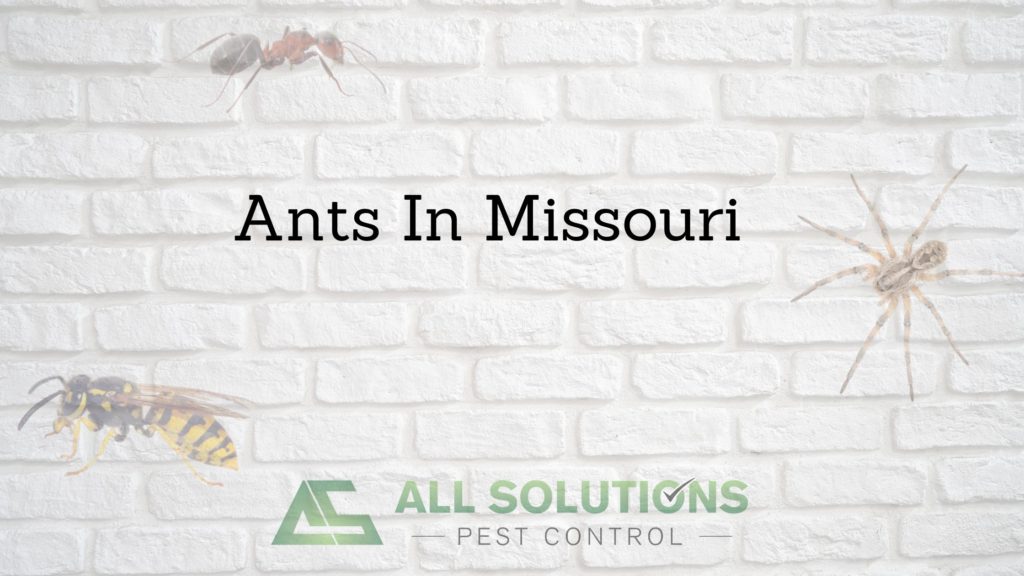Ants are social insects that are very common in different ecosystems throughout the world. There are more than 450 different species present in North America alone. In human dwellings and environments, ants are one of the most common kinds of pests present. They build their nests adjacent to foundation walls, under boards, stones, concrete slabs, or in open lawns, soils, cavity spaces around debris, in decaying wood, or walls of houses. While some of their nests last for a short time, others are relatively permanent. According to studies, there are less than fifty ant species found to inhabit homes in the US, and among them, around ten species are commonly found in Missouri. If you are seeing ants around your home give us a call today so we can be your pest control professional!
So, here are some of the five most commonly found ants in Missouri:
- Monomorium pharaonis (Pharaoh ant) – This species of ants are only around one to two mm in length and light tan in color. These common structural pets are generally found in void areas indoors and are present in large colonies. This species of ants usually don’t swarm, and the queen can establish budding in almost any small available space. They are commonly seen in areas like electrical outlets, behind baseboards, and in wall voids. Pharaoh ants are scavengers and feed on all types of foods, including sweets, proteins, and fats.
- Tapinoma sessile (Odorous house ant) – Dark brown to black in color, the odorous house ants, are the most commonly found ant species that infest homes in Missouri. They are around two to three mm in length. If you crush an odorous house ant between your fingers, you will get a fruity-coconut smell. This is one of the most identifiable characters of the species. They build their nests in void areas both indoors and outdoors and have multiple queens. When it’s not raining, they tend to be outdoors and feed on plant nectar and honeydew. However, they invade houses in large numbers when it starts to rain and search for food. They are mainly attracted to protein-rich foods or fatty, sweet foods and are usually found in people’s kitchens.
- Crematogaster spp. (Acrobat ant) – The acrobat ants can differ in color from black to brown to reddish-brown and are around three mm in length. The most distinguishing characteristic of the acrobat ants is their heart-shaped abdomen with a pointy tip. They establish their colonies in deadwood in various different locations like dead branches of trees, stumps, partially decayed logs, and even in woodworks on houses. Inside houses, they generally infest windows and doors that are already damaged by moisture as well as foam panel insulations. They are attracted to greasy and sweet foods present in people’s houses.
- Tetramorium caespitum (Pavement ant) – This species of ant ranges from black to dark brown in color. About two to three mm long, they have light legs and antennae. Parallel ridges and furrows are present on their head and thorax, which differentiates them from other species. They generally build their nests in the soil under pavements, stones, or in the open. During spring, these ants infest people’s houses and emerge from false ceilings, heat registers, expansion joints, or from under baseboards.
- Camponotus pennsylvanicus (Carpenter ants) – When seen from the side, carpenter ants have an evenly rounded thorax. Their size usually ranges from ¼ to 5/8 inches in length. C. pennsylvanicus is the largest and most common species of carpenter ants. Completely black in color, they tend to build their nests in rotting logs and such already-decaying woods. They become household pests by foraging for food indoors. They generally eat anything including fats, meats, dead and living insects, and sweets of any kind, such as nectar from plants or honeydew from aphids.
Ants can quickly become a nuisance if you don’t do anything to keep their population in control. We, at All Solutions Pest Control, provide expert pest control solutions to help eliminate any forms of ant infestations in your house. Simply give us a call at 636-486-7888 or mail us at [email protected]
